Fried polenta is a traditional side dish popular in Northern Italy that is made with leftover polenta. Buttery, crispy outside and creamy inside, this pan-fried polenta is an easy, gluten-free, delicious side dish to serve with saucy dishes like ragu, meat, or vegetable stew. Traditionally, these polenta fires are served with cheese and mushrooms but can also be a great appetizer with a dipping sauce.
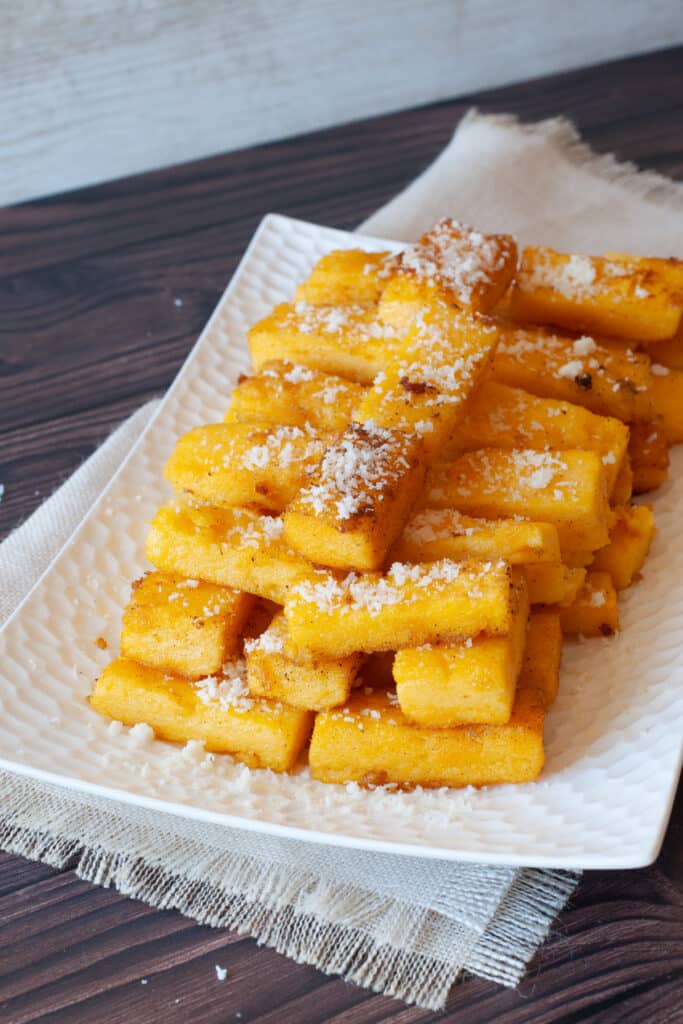
Jump to:
Polenta is boiled cornmeal, like warm porridge, that Italians like to eat with plenty of melted cheese or serve as a side dish to stews.
Because of its consistency and mild taste, polenta combines well with sauces and melted cheese as it absorbs the flavor and juices.
Traditional polenta takes a long time to make as it requires stirring for about 1 hour, so polenta is often made in large quantities.
When polenta cools down, it solidifies and is not as easy to warm up.
So fried polenta is usually done with leftover polenta.
It can be cut into different forms, such as round, square, or rectangular, and it will keep its shape.
Cutting polenta into smaller shapes makes it easier to warm up.
While it stays warm and creamy in the center, it forms a nice crispy crust on the outside.
Polenta slices can be either fried or baked.
In this recipe, we pan fry them in butter.
For more recipes with polenta, you can check chocolate wild boar, sweet polenta cakes.
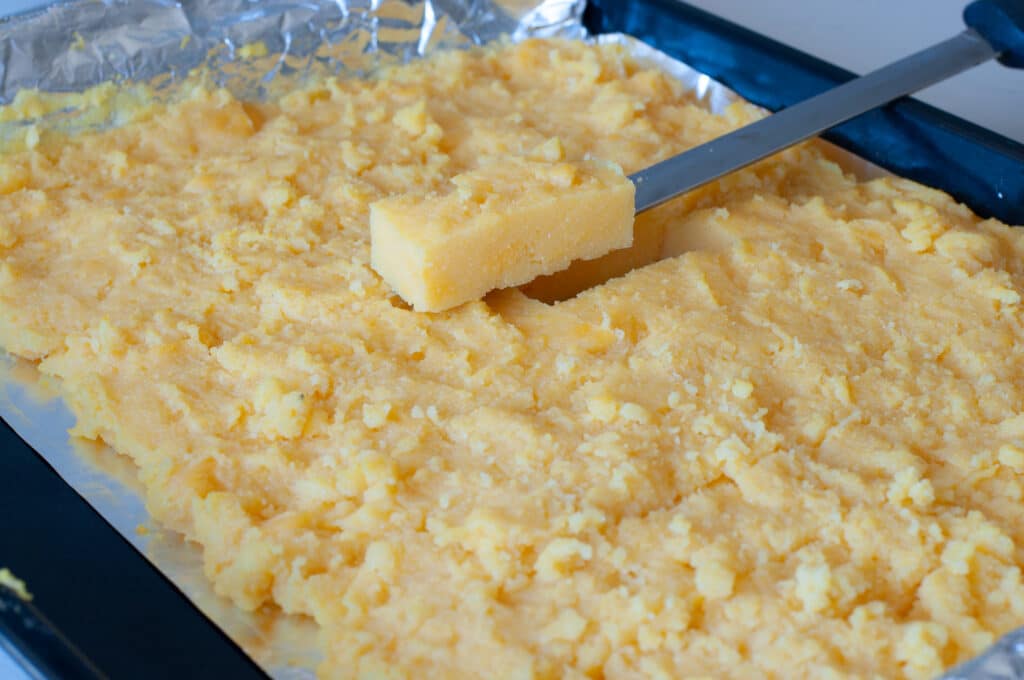
Ingredients
Types of polenta
There are 3 different types of polenta in Italy:
- Polenta Taragna - made with corn and buckwheat, usually served with cheese and butter
- Polenta Bramata - made with coarse grain, usually served with meat
- White Polenta - made with white corn, is usually served with fish
You can use either type of polenta, depending on what you want to serve it with.
Note: here I served it with grilled scamorza cheese, so I used the Polenta Taragna
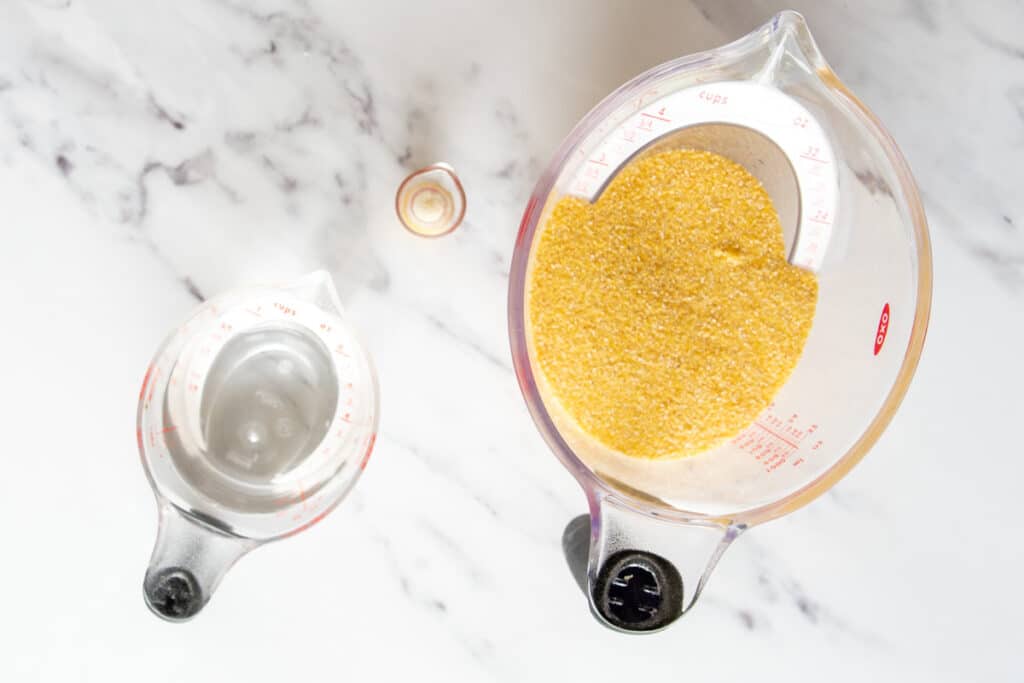
Other ingredients
The other ingredients for this recipe are:
- Butter and olive oil for frying: I like to mix olive oil and butter as the butter gives the polenta a nice flavor
- Parmesan cheese to sprinkle on top while still warm
See the recipe card for quantities.
I serve the fried polenta with grilled Scamorza cheese, stir-fried porcini, and white button mushrooms.
If it is not porcini season now, you can use dry porcini and you can find instructions in this article: How to use dried porcini mushrooms
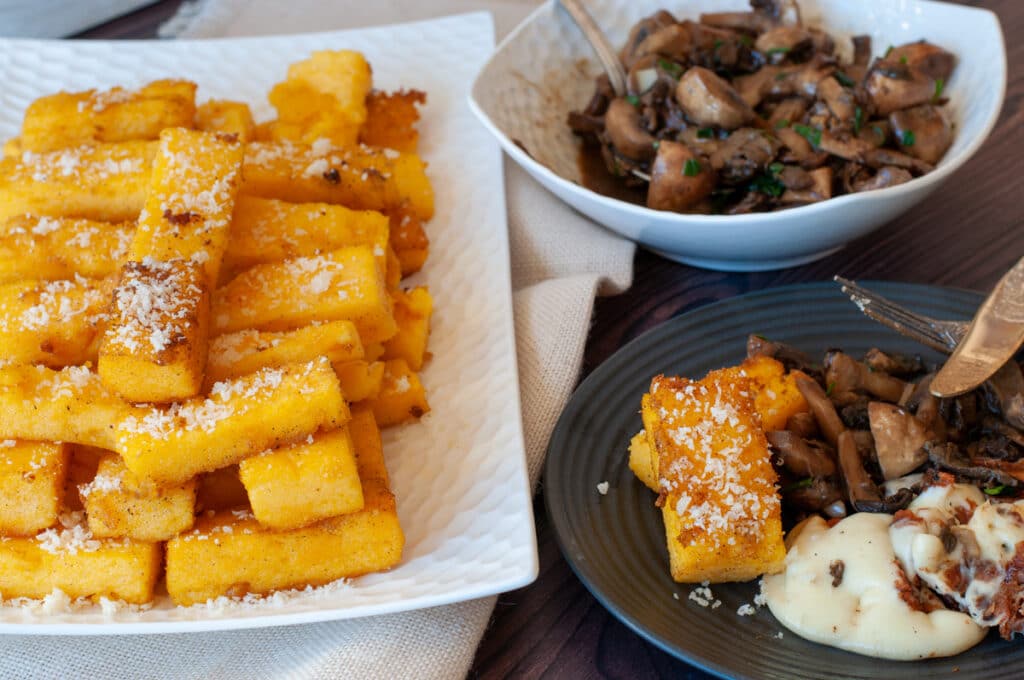
Instructions
Make the polenta
- Fill a large cauldron with salted water and bring it to a boil.
- Once it is boiling, add the polenta, gradually stirring with a wooden spoon to ensure no lumps.
- Stir continuously for 50 minutes to 1 hour until the polenta detaches from the edges of the pot. If you lift the spoon, it will stay attached.
- Pour the polenta over a sizeable wooden base or a large oven tin covered with greased foil. You can brush it with some olive oil.
- Spread flat uniformly in an even layer with a spoon.
- Wait for the polenta to cool down at room temperature for about 1 hour.
Hint: Cover the polenta with parchment paper and roll it with a rolling pin to make it perfectly flat.
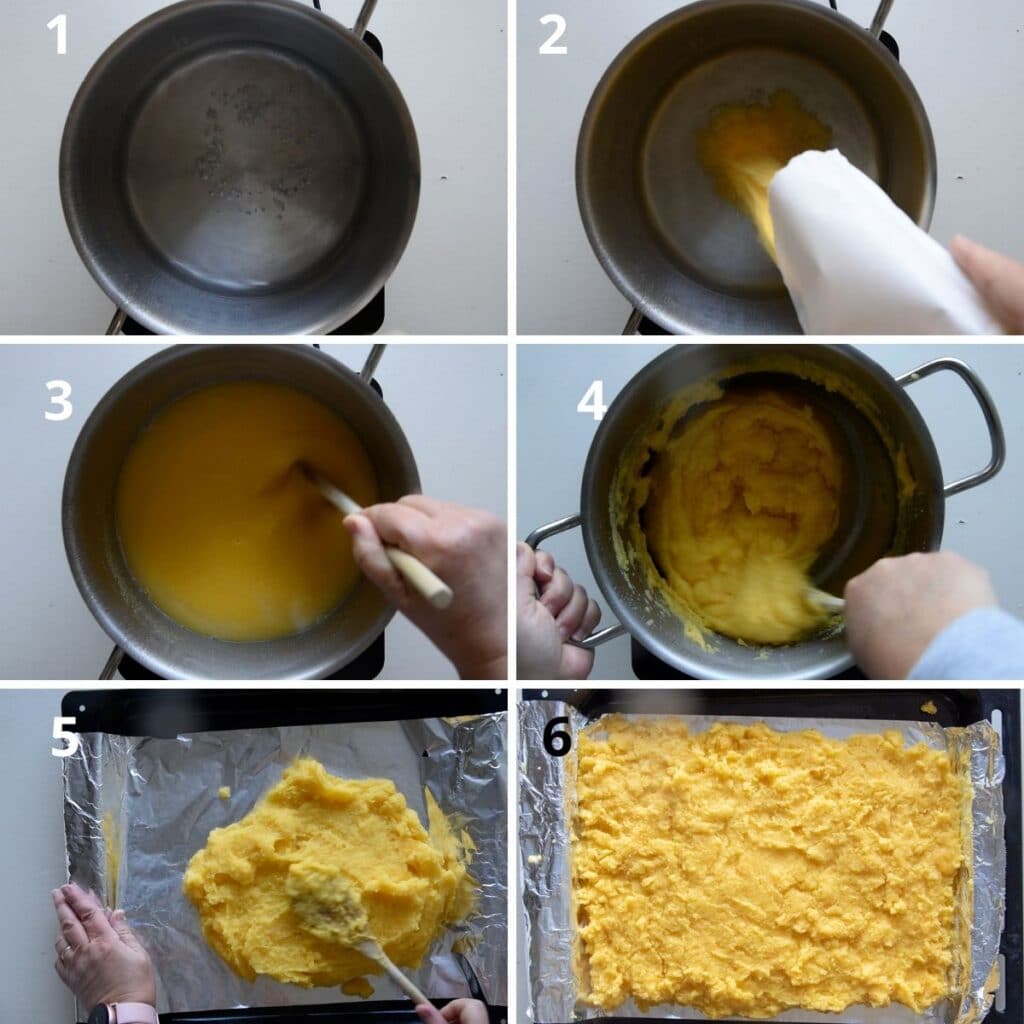
Frying the polenta
- Cut the polenta into rectangular sticks (3'X1.5' - 8cm X 4cm)
- In a frying pan, warm up olive oil and butter at medium-high heat
- Place the polenta cakes and fry
- Turn onto the other side once the polenta gets a golden brown color and crispy perfection
- Place on a serving plate
- Sprinkle with freshly grated parmesan cheese while still warm and serve immediately
Hint: I like to fry the polenta with a mix of olive oil and butter, as using both gives the polenta more flavor. If you prefer, you can use only one or the other or use vegetable oil for a milder flavor.
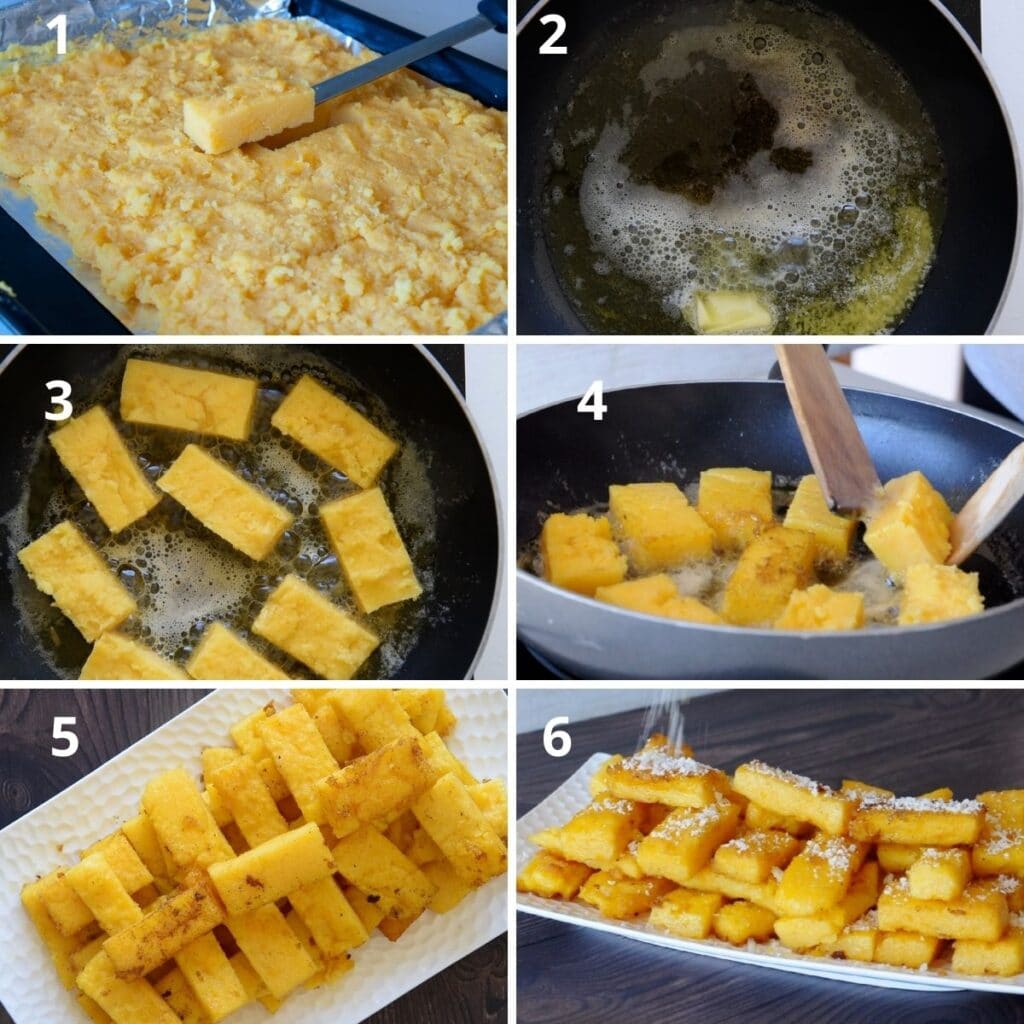
When to serve it
For Italians, polenta fries are usually made with leftover polenta and served as a side dish to accompany the main dish, usually stew or ragu.
Also, fried polenta is often served as a quick meal with melted cheese and sauteed mushrooms.
It is normally served for dinner on a cold winter day or after an exhausting day of skiing in the Alps.
Italians would not have it at breakfast, as traditional Italian breakfast is mainly sweet.
However, it is an excellent vegetarian breakfast.
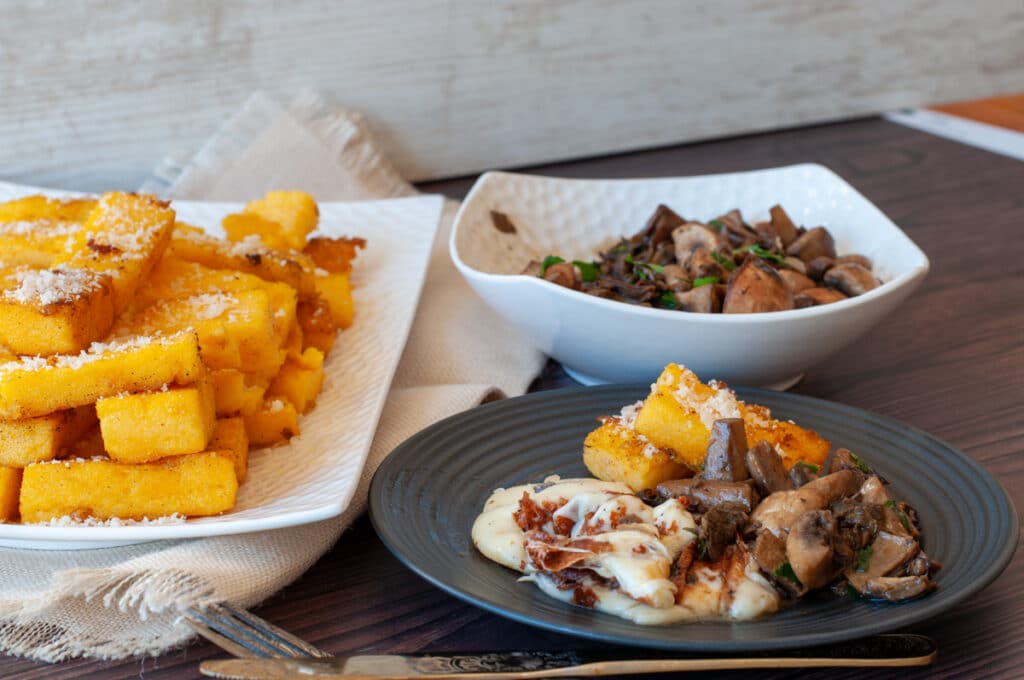
Substitutions
Polenta is vegan and gluten-free, so it is suitable for many diets.
You can substitute polenta with semolina (NOT semolina flour).
While polenta is made from yellow corn, semolina is made with durum wheat.
Polenta has a crumblier and coarser grind, while semolina is finer, smoother, and easier to digest.
A great remedy for an upset stomach.
Some Italians don't like semolina as they associate it with being sick.
You can check the recipe: Gnocchi alla Romana
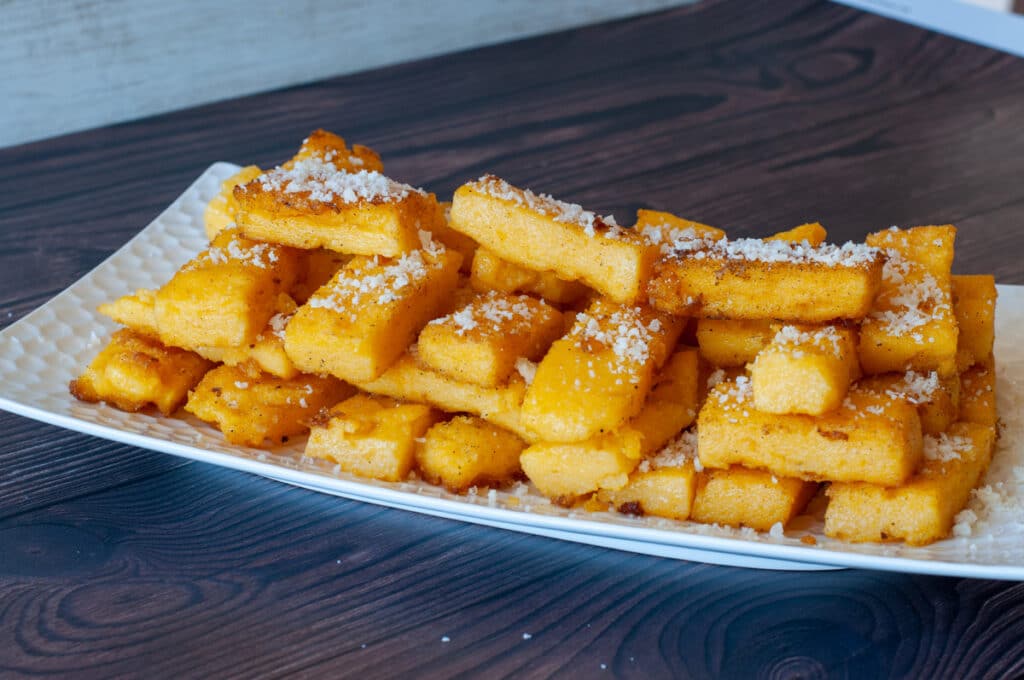
Variations
You can also make this recipe using:
- Pre-cooked polenta, or instant polenta, is cornmeal that has been partially cooked and dried. This process allows for quick preparation at home, reducing cooking time significantly. To prepare, you add the pre-cooked polenta to boiling water or broth and stir until it reaches the desired consistency, which usually takes a few minutes. It's a convenient option for making polenta dishes without the longer cooking time required for traditional polenta.
- Tubed Polenta—You can buy ready-cooked polenta shaped into tubes. You only need to cut it into slices and fry them. It's a great shortcut, but of course, the flavor of homemade polenta is much better.
- Deep fry - instead of frying the polenta in a pan, you can use a deep fryer or an air fryer
- Baked polenta—For a healthier option, you can bake the polenta. Place the polenta cakes into a baking dish in a single layer and top them with butter and Parmesan cheese so they form a nice crunchy crust.
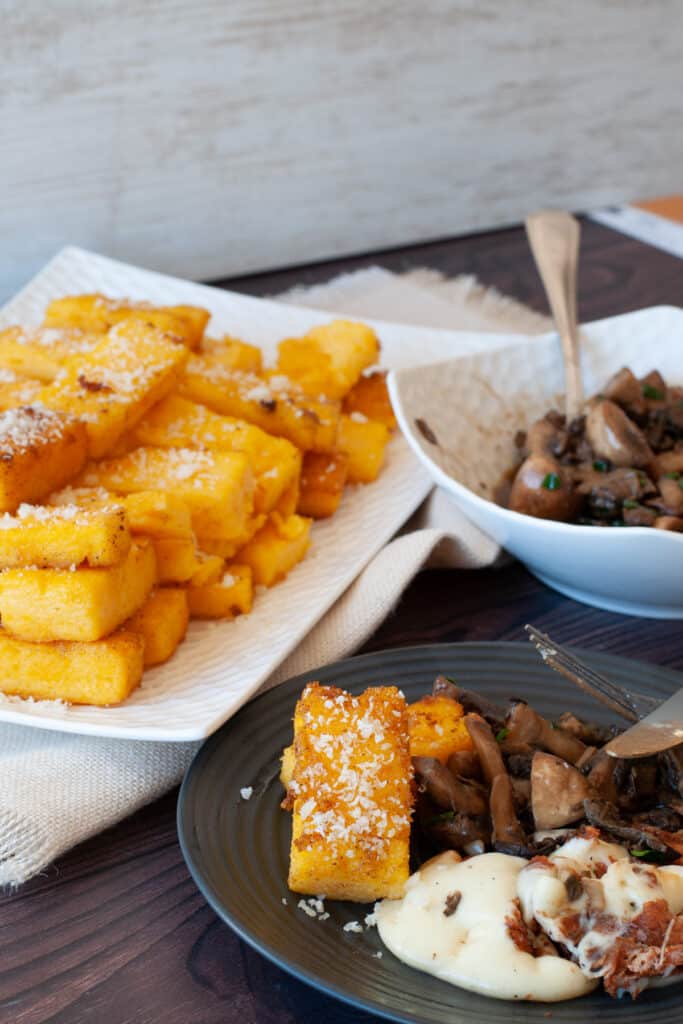
Equipment
Traditionally polenta was cooked on a cauldron "Paiolo" over the fire and stirred constantly for an hour with a wooden spoon called "cannella".
As you need to stir polenta for a long time, I have Oxo wooden spoons which have comfortable handles.
The Paiolo is usually a copper cauldron as it is a great heat conductor.
It cooks the polenta thoroughly without altering its flavor and prevents the polenta from sticking to the bottom of the pan.
If you do not want to stir for an hour you can buy an electric copper cauldron.
Once cooked, the polenta is placed over a wooden cutting board and served with the meal.
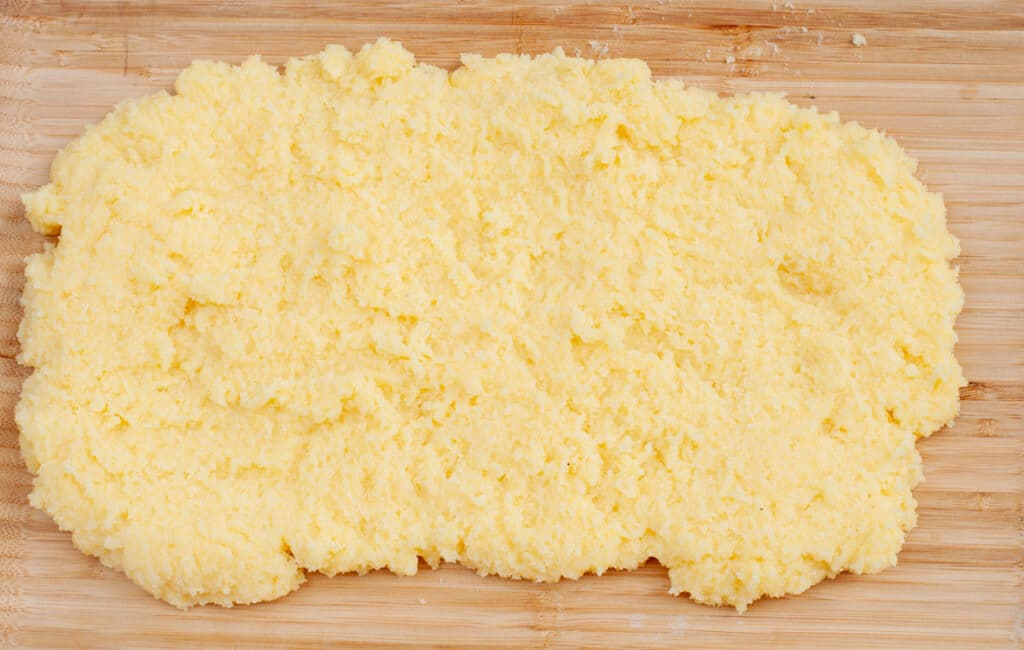
Storage
You can store fried polenta in the fridge for up to 3 days and seal it into an airtight container as it tends to dry out.
You can heat it in the oven before serving it to make it crispy again.
Polenta is not suitable for the freezer as it retains too much water.
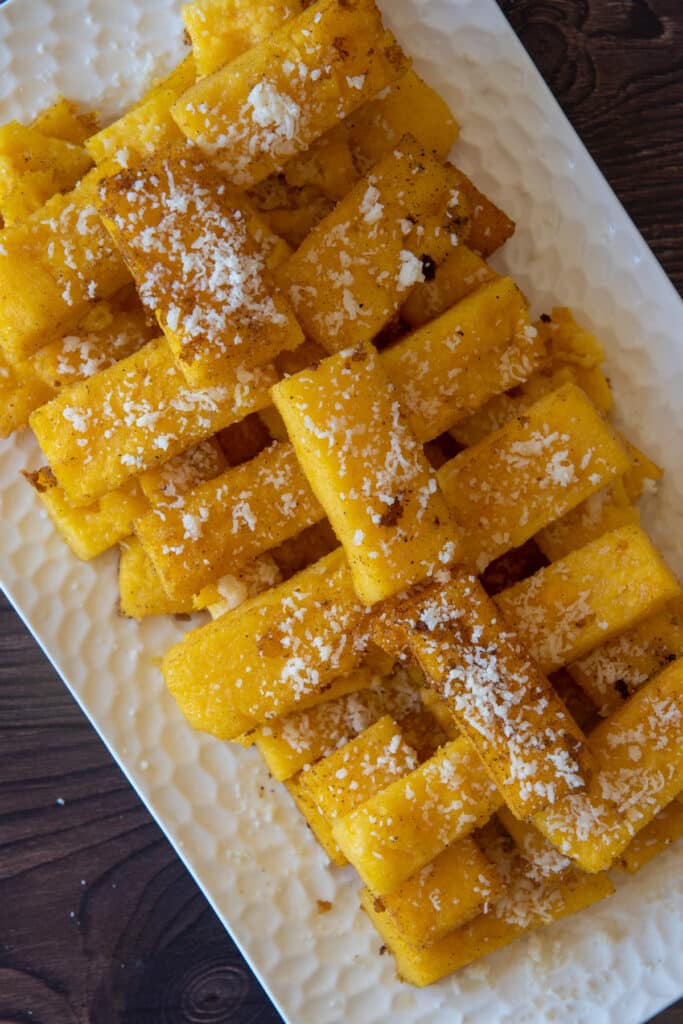
Historic background
Polenta is a traditional Italian dish made from ground cornmeal. It's cooked by boiling in water or broth to a porridge-like consistency.
A similar dish was made initially in Mesopotamia with millet and rye, in Greece with barley flour, while the Romans used spelt.
After Columbus brought back corn from the Americas, polenta was made with corn flour.
As it was a very profitable cultivation, the use of corn quickly spread into Europe, Africa, and Asia.
The polenta was traditionally a lower-class meal, often being combined with simple ingredients.
For example:
- Polenta taragna made with corn and buckwheat and served with cheese
- Polenta osei served with birds
- Polenta alla contadina served with pork cracklings
- Polenta pasticciata served with a mix of different types of meat stew
Polenta is very common in northern Italy: Piemonte, Lombardia, Veneto.
For more information about historic background on Italian food you can read the articles: History of Italian food by Region, Italian food history and cultural influences, Italian street food recipes.
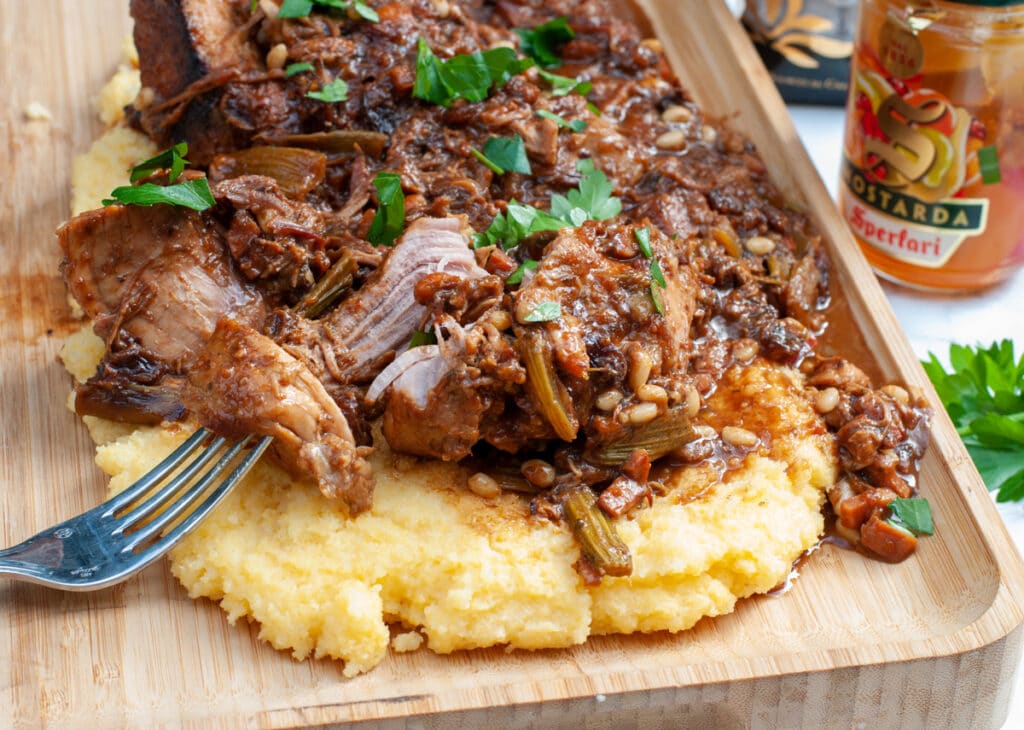
FAQ
Make sure that you use a pan with high heat thermal conductivity such as copper or cast iron. DO NOT use steel pots.
Anything juicy: sauces, melted cheese, meat, and vegetable stews.
Instant polenta is not as good as the regular polenta but I know that stirring for 1 hour can be exhausting. So, it is up to you, knowing you miss out on flavor. Alternatively, you can buy an electric cauldron.
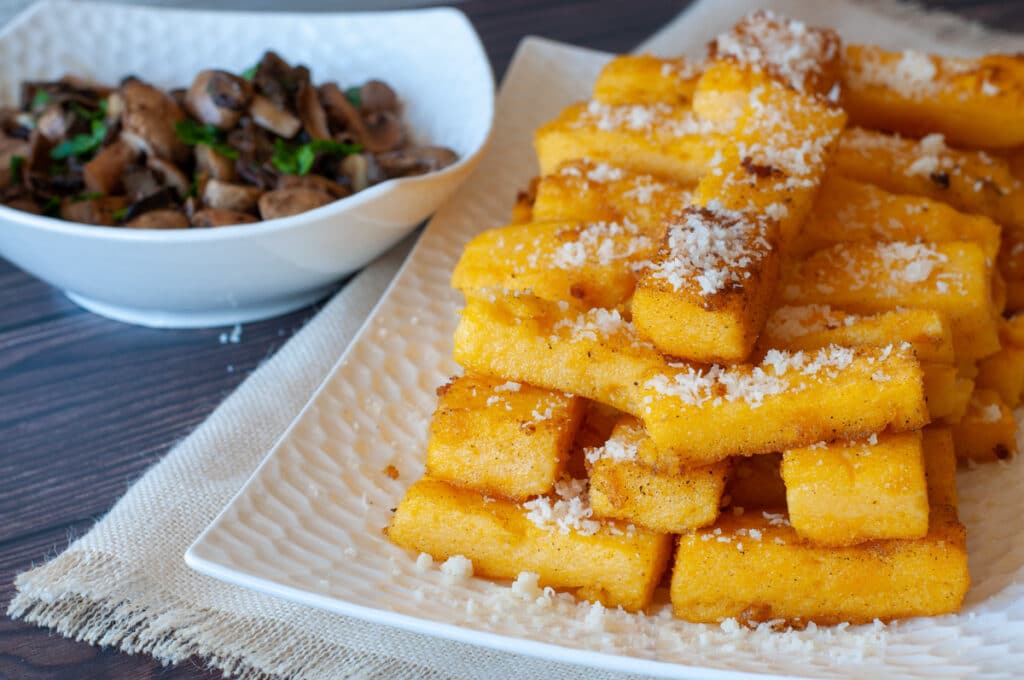
Recipes using polenta
If you are making the Italian crispy pan fried polenta, leave your comment below I would like to hear from you. You can find more delicious ideas if you FOLLOW ME on Facebook, YouTube, Pinterest and Instagram or sign up to my newsletter.
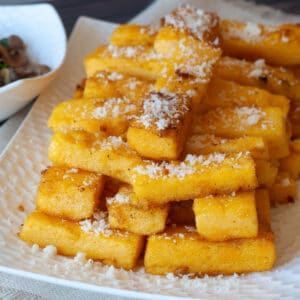
📋 Italian Crispy Pan Fried Polenta
Ingredients
Make the polenta
- 2 cup Polenta Taragna
- 4 cup water
- ½ tablespoon salt
- 1 tablespoon olive oil
- 1 tablespoon butter
- freshly grated Parmesan to sprinkle on top
Equipment
Instructions
Make the polenta
- Fill a large cauldron with salted water and bring to boil.4 cup water, ½ tablespoon salt
- Once it is boiling add the polenta gradually stirring with a wooden spoon, making sure there are no lumps.2 cup Polenta Taragna
- Stir continuously for 50 minutes to 1 hour until the polenta detaches from the edges of the pot. If you lift the spoon it will stay attached.
- Pour the polenta over a large wooden base or over a large oven tin covered with greased foil. You can brush it with some olive oil.
- Spread flat and uniformly with a spoon.
- Wait for the polenta to cool down completely, about 1 hour.
Frying the polenta
- Cut the polenta into rectangular sticks (3'X1.5' - 8cm X 4cm)
- In a pan warm up olive oil and butter1 tablespoon olive oil, 1 tablespoon butter
- Place the polenta cakes and fry
- Turn onto the other side once the polenta gets a brown color
- Place on a serving plate
- Sprinkle with freshly grated parmesan cheese while still warm and serve immediatelyfreshly grated Parmesan
Video
Notes
- As a shortcut, you can either buy instant polenta which needs only 15 minutes to make, or the already made tube polenta
- If you want to make it perfectly flat cover it with parchment paper and roll it with a rolling pin.
- I like to fry the polenta with a mix of olive oil and butter as they give more flavor. If you prefer you can use only one or the other or use vegetable oil for a milder flavor.
Nutrition
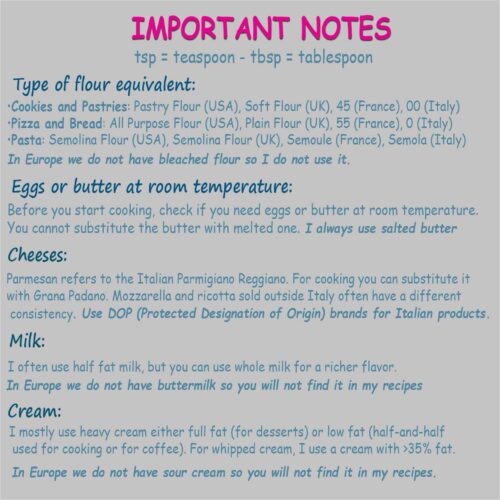


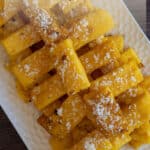
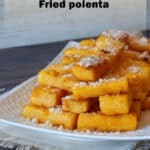
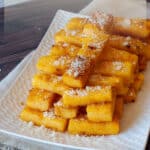

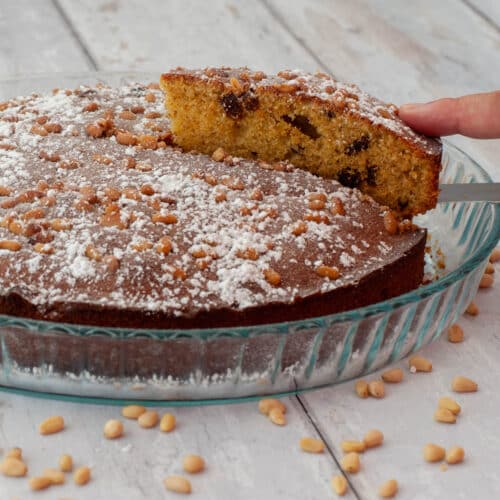
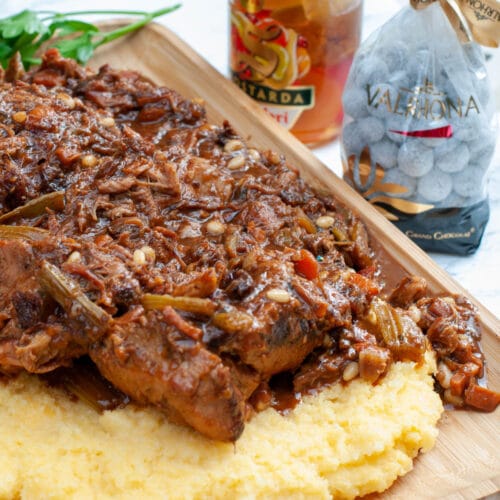
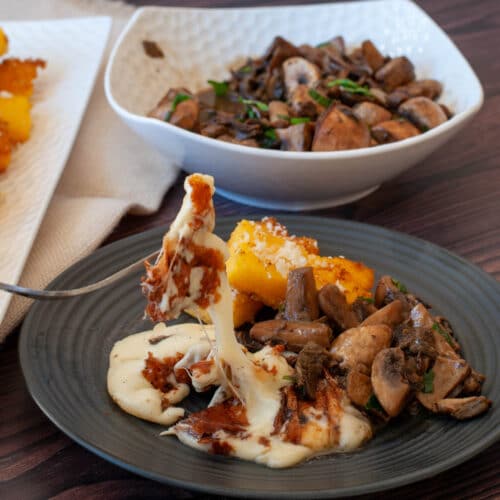
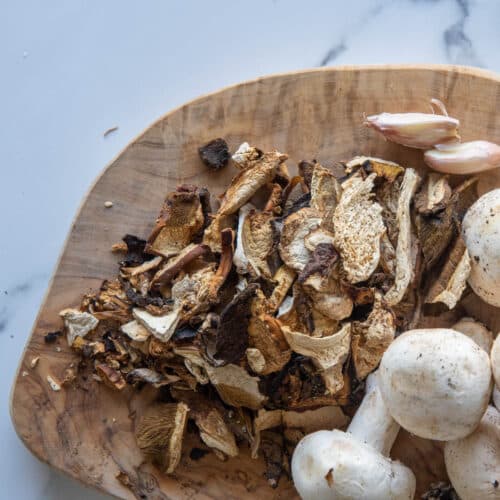




William Stewart
I thought semolina was made from durum wheat, not from white corn. Is there such a product called semolina?
Laura
Yes, sorry. The name got lost in translation. It is durum wheat, although it should not be confused with Semolina flour which is fine semolina. What in Italy is called Semolino is coarse semolina
Carla
I tried to pan fry my cut up polenta with a mix of butter and olive oil and it did not brown but got mushy and stuck to the pan. I made sure the pan was sizzling. My polenta was in the refrigerator for two days so it was firm. What am I doing wrong? I LONG for fried polenta and I keep trying but with no success.
Laura
Hi Carla, for what you say it could be that you do not use the right polenta mix. Why don't you try with a tube polenta and see if that works. The affiliate link here below:
https://amzn.to/47E3eiI
JoannaNYC
Semolina has nothing to do with polenta or grits. Polenta is corn meal and grits are hominy corn that was treated with alkali, while semolina is flour ground from hard durum wheat. Oddly enough most hard wheat for semolina is imported from Montana to Italy and then shipped back as 00 flour or pasta.
Carla, you need to reduce the liquid from 4:1 to 3:1 ratio for it to hold up better when frying.
Laura
Thank you for your comment. Yes, Semolina has nothing to do with polenta, I am not sure where you read that. However in Italy we have some recipes where polenta tubes or semolina tubes can be use interchangeably when baked in the oven like the gnocchi alla Romana. I am talking about Semolina, NOT semolina flour. They are two different things.
Semolina:
https://www.dececco.com/gb_en/product/semolino/
Semolina flour:
https://www.dececco.com/gb_en/product/farina-di-grano-duro/